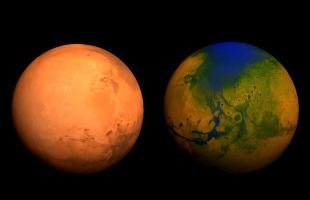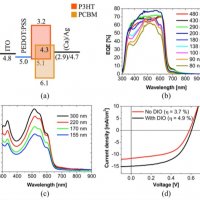Copy Link
Add to Bookmark
Report
The Martian Chronicle No 04

******************************************************************************
T h e M a r t i a n C h r o n i c l e
August 1990 No. 4
******************************************************************************
The electronic newsletter by the International Mars Patrol (I.M.P.),
an observing program of the Association of Lunar and Planetary Observers
(A.L.P.O.)
Edited by: J.D. Beish
------------------------------------------------------------------------------
Is Mars' South Polar Missing?
Several observers have reported the disappearance of the Martian south
polar cap (SPC). Because southern summer began on July 30th. the SPC was in
rapid retreat during August and should not be very large. For those of us in
the United States, observing Mars' during mid-August (Central Meridians (CM)
from 150 - 270 degrees) the south limb will resemble a great "bald spot" where
the SPC should be. The cap will be very hard to see for Northern Hemisphere
observers because the cap is offset 7 degrees from the pole towards 30 degrees
longitude. Therefore, the SPC is on the other side of the planet from us.
From mid-August, the planetocentric declination of Earth (De) will be -11.2
deg. and decrease to -3.9 deg. by the end of September. This will also place
the south polar region of Mars in a difficult position to observe for every
one.
The two polar caps of Mars are composed differently. The north cap is a
water ice cap covered with layers of carbon dioxide ice. While water has been
detected in the south cap, it is mostly carbon dioxide. Because the atmos
pheric pressure of Mars is too low for liquid water to exist on its surface,
frozen materials in the caps do not melt but sublimate at temperatures above
zero.
Mars looks strange?
Are we seeing new dark features on Mars or just changing shadows? Those
who regularly observe the Moon know that shadows cast by Lunar surface fea
tures change its surface appearance from day to day. Although certain Martian
surface features are known to physically change in shape and darkness, shadows
also effect the appearance of the Red Planet's surface. Shadows have a direct
effect on the appearance of regions such as Tharsis -- with its steep rise
from a large valley floor to its 12 and 16 mile high volcanoes -- or Hellas,
which is shaped like a very large and deep crater. Remember also that shadows
are longer near the planet's morning and evening limbs or terminator and are
shorter nearest to the planet's noon hour (sub-solar point). In August, Mars'
south pole is tilted toward the Sun, so, the shadows will appear to point in a
more northerly direction. As the Martian seasons change from summer to au
tumn, these same shadows will change directions as well, giving its surface a
slightly different appearance.
However, don't let the shadows fool you, report all changes on the Mar
tian surface to the ALPO Mars Recorders as soon as possible.
******************************** DUST STORMS *********************************
* *
* Again, we must caution observers not to confuse those Martian white clouds *
* or bright white surface deposits with dust clouds.We have received several *
* calls and letters this month from observers claiming to have seen a large *
* dust storm on Mars. While observing both visually and with sensitive CCD *
* cameras, the ALPO Mars Recorders can find no trace of dust either on the *
* Martian surface or in its atmosphere as of August 27, 1990. Remember, dust *
* clouds are very bright in red light and they usually move about covering *
* over portions of the Martian surface. *
******************************************************************************
*** GUIDELINES FOR IMP OBSERVERS ***
1. ALPO MEMBERSHIP: Membership in Association of Lunar and Planetary Observ
ers (ALPO) is not mandatory for the IMP. However, we strongly urge our observ
ers to join, if for no other reason than they can see the fruits of their
labor in print in the apparition reports and other papers in The Strolling
Astronomer. Subscribing to the J.A.L.P.O. also gives one the opportunity to
read about others' observational techniques and methods of data reduction. In
addition, the observer may find other fields which stimulate his interest,
such as observing Pluto. U.S., Canada, and Mexico, send $14 for one year or
$24 for two years to Harry D. Jamieson, P.O. Box 143, Heber Springs, Arkansas,
72543. Other countries: $16 for one year, $29 for two.
2. CORRESPONDENCE: All correspondence should contain an enclosed S.A.S.E.
Remember that the A.L.P.O. staff is voluntary -- both with time and money!
OBSERVING AIDS
************************** MARS OBSERVER'S HANDBOOK **************************
* *
* Now available from the Astronomical League is the Mars Observer's Handbook *
* by Jeffrey D. Beish and Charles F. Capen at a new low price of $8.00. This *
* very important and informative book is in second printing due to popular *
* demand. Formerly published for The Planetary Society's Mars Watch '88, the *
* book was sold out and has been out of print for the past two years. Send *
* $8.00, check or money order to: Astronomical League Sales, Four Klopfer *
* Street, Pittsburgh, PA 15209. *
* *
******************************************************************************
a) The A.L.P.O. Solar System Ephemeris: 1990. This contains the complete
ephemerides for the Sun, Moon, planets and minor planets as well as selected
comets. This is a "must" if one is to get full enjoyment from his observing.
Send $6.00 to A.L.P.O., P.O. Box 16131, San Francisco, CA 94116.
b) Introduction to Observing and Photographing the Solar System, by T.A.
Dobbins, D.C. Parker, and C.F. Capen. Contains both theoretical and observa
tional information on Solar System objects. Very detailed chapters on Mars,
astrophotography, micrometry, etc. Forward by A.L.P.O. founder Walter H. Haas.
Hardcover, $19.95 from Willmann-Bell, Inc., P.O. Box 35025, Richmond, VA
23235, (804) 320-7016.
c) IMP Astronomical Calculator (IMPAC). Computer program containing complete
ephemerides of Mars and Jupiter for any year and geographical location. Also
rise and set times, altitude, azimuths for all Solar System objects for
observer's location. Automatic correction for Daylight Time, lunar phases for
star party planning, telescope and mirror cell design, and comprehensive
astrophotography program. Subroutines for color filter calculations and auto
matic computation of Martian polar cap and Jovian belt latitudes from
observer's input. For IBM XT, AT and compatibles, monochrome, EGA, or VGA. For
a 5.25-inch diskette, send $49.95 to J.D. Beish, 9460 Toni Dr., Miami, FL
33157.
THE A.L.P.O. MARS SECTION -- 1990
ALPO Mars Recorders have been assigned to a geographical area. Observers
should correspond with the recorder in his or her area:
JEFF BEISH, 9460 Toni Dr., Miami, Fl, 33157: AL, AR, FL, GA, HA, KY, MS, NC,
SC, TN, and VA.
HARRY CRALLE, 3902 E. 29th St. (J-4), Bryan, Texas, 77802: AZ, CA, CO, KS, LA,
MO, NV, NM, OK, TX, UT, and WY.
CARLOS HERNANDEZ, 2714 Plaza Dr., Woodbridge, NJ, 07095: AK, CT, DC, DE, MA,
MD, ME, NH, NJ, NY, PA, RI, and VT.
DON PARKER, 12911 Lerida St., Coral Gables, FL, 33156: U.S. Territories and
Possessions and all areas outside U.S.
DAN TROIANI, 629 Verona Ct., Schaumberg, IL, 60193: IA, ID, IL, IN, MI, MN,
MT, ND, NE, OH, OR, SD, WA, WI, WV.
3
*******************
* *
* Again, we must ca

















